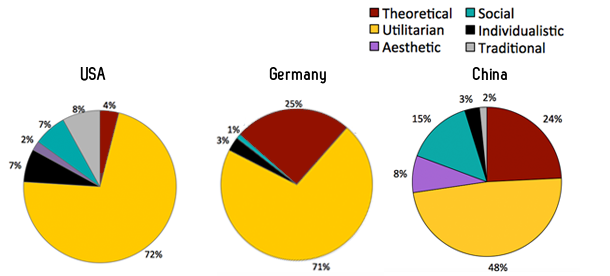DISC Profile & Motivators of Top Sales Performers
Research studies of top salespeople in the United States, Germany and China revealed some interesting results. Take a look at the charts below.
DISC Make-Up
The DISC profile identifies four basic patterns that people tend to have. Dominance (Assertive, Direct); Influence (Outgoing, Talkative); Steadiness (Amiable, Easy Going); Compliance (Precise, Analytical). By blending these, we end up with 8 major styles:
- Conductor - D
- Persuader - D and I
- Promoter - I
- Relater - I and S
- Supporter - S
- Coordinator - S and C
- Analyser - C
- Implementor - D and C
.png?width=610&height=305&name=disc_profile_charts%20(1).png)
In the US study, top sales performers tended to be spread across four behavioural patterns (Conductor, Persuader, Promoter, Relater); in the German study, they tended to be spread across three (Persuader, Promoter, Relater). As for China, there is a more even distribution, but the majority of top salespeople in China are Promoter, Relater, Coordinator, Analyser, with fewer D-blends.
In view of these results, it is reasonable to conclude that salespeople with most behavioural patterns can be top performers, although it is statistically less likely for those with Coordinator, Analyser, or Implementor in the US and Germany. It is especially less likely for the Analyser (High C), which only had 1% in both the US and Germany. Whereas in China, having a High C looks as though it is much more beneficial at 15%.
Motivational Make-Up
The Workplace Motivators profile measures six attitudes (values or passions) of major importance.
- Utilitarian: A focus on practicality and efficiency.
- Theoretical: A focus on education, learning and truth.
- Aesthetic: A focus on beauty, harmony and balance.
- Social: A focus on helping others.
- Individualistic: A focus on controlling one’s own destiny & the destiny of others.
- Traditional: A focus on a system for living.

When it comes to Motivators, each of the studies confirm the importance of the Utilitarian value.
This indicates that top sales performers are motivated by practical results, rewards and a return on investment; a large percentage in Germany and China are also motivated by learning and understanding the world (Theoretical).
It doesn’t necessarily mean that everyone who has a high Utilitarian motivator has the potential to be a top sales performer, but it does mean that people who don’t have a high Utilitarian may struggle to make it to the top.
Can we predict top sales performance based on behavioural style or motivators?
These charts do not represent top sales performers specific to any one industry, and only serve tell us what the 'average' top salesperson might look like. The make-up would change depending on what industry within sales was given the focus. For example, with top I.T sales performers we would expect the high C to play a more significant role, and again, the results could change each time depending on the country or even the city being studied.
In recruiting salespeople, it is possible to work out the most ideal DISC graph and Motivators for a specific position, which is accomplished through a process called Job Benchmarking. Even with a job benchmark in hand, it is still important to remember that behavioural style by itself is not a valid predictor of top sales performance; it only serves as one piece of information to help make a more informed hiring decision.
It is clear though that in most benchmarks we could expect to see the Utilitarian value as the highest, and this is a very clear indicator of top sales performance across three continents. It is reasonable to conclude that if salespeople do not have a Utilitarian value in highest (or second highest) position, they will struggle to succeed.
- Germany Study, N = 492
- USA Study, N = 178

Theo Winter
Client Services Manager, Writer & Researcher. Theo is one of the youngest professionals in the world to earn an accreditation in TTI Success Insight's suite of psychometric assessments. For more than a decade, he worked with hundreds of HR, L&D and OD professionals and consultants to improve engagement, performance and emotional intelligence of leaders and their teams. He authored the book "40 Must-Know Business Models for People Leaders."

/how%20do%20motivators%20%20effect%20your%20disc%20profile.png?width=374&name=how%20do%20motivators%20%20effect%20your%20disc%20profile.png)
/motivators%20profile_%20executive%20summary.png?width=374&name=motivators%20profile_%20executive%20summary.png)
We Would Like to Hear From You (0 Comments)